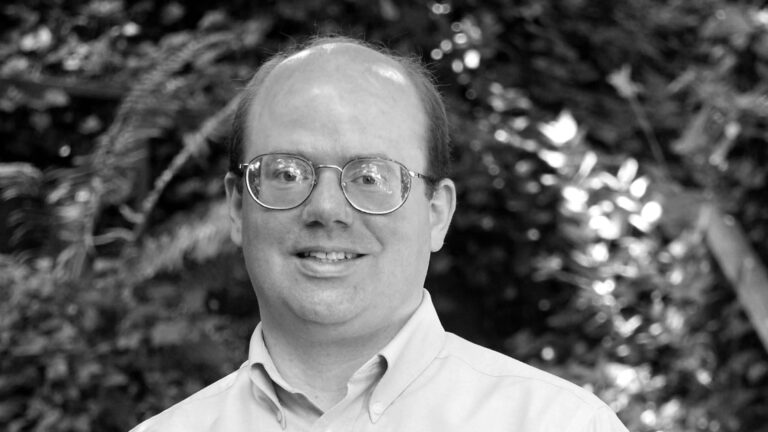It happened so long ago. It’s the distant past. Most of those involved are long dead or too old to remember. Do we really want to punish an 87-year-old, dying man for something he did half a century ago? Can’t we just move on?
These are questions and sentiments raised by white Alabamians in White Lies, an excellent new investigative podcast from NPR. The seven-episode series, which premiered in May, follows journalists Andrew Beck Grace and Chip Brantley as they revisit an infamous civil-rights-era cold case: the 1965 murder of white clergyman James Reeb in Selma, Alabama.
While walking down the street, Reeb and two other white ministers—in Selma to march on behalf of civil rights—were attacked and beaten by a gang of white men. Reeb was clubbed in the head and died of his wounds. His death sparked a national outcry, but no one was ever held to account. Three men were tried for Reeb’s murder but acquitted by an all-white jury. The defense posited a conspiracy theory that became the accepted truth among Selma’s white residents: Reeb was only injured in the attack on the street; he actually died at the hands of civil-rights leaders who wanted a white martyr for their cause.
In White Lies, Grace and Brantley go knocking on doors in Selma, in search of the truth. They face a lot of “leave me out of it” closed doors from folks who’d rather not be confronted with Selma’s ugly past. But they are diligent in their investigation, modeling a sort of unflinching commitment to truth—however uncomfortable it may be—that Christians would do well to emulate.
Past Is Never Just Past
White Lies is a riveting series with the sorts of twists and turns we’ve come to expect in true crime podcasts. But it’s more than just entertainment. The podcast reminds us of the importance of journalism and the value of rigorous investigations and on-the-ground research. In our hyper-fast, no-patience media environment, White Lies demonstrates the beauty of long, nuanced inquiry. It explores a story with 54 years of characters and complex layers of memory, guilt, bias, and self-deception. And this is on top of hundreds of years of an American history that deeply shaped the events of 1965, as it does the events of 2019.
The past is never just the past, even if we wish we could absolve ourselves of it and move on. We are products of the past, inextricably bound up with it. That’s a major takeaway from White Lies.
The past is never just the past, even if we wish we could absolve ourselves of it and move on. We are products of the past, inextricably bound up with it.
Many people interviewed in the series don’t want to talk, because they say there is no point digging up these old stories. Others question the point of sending an octogenarian to jail for crimes committed a lifetime ago.
Michael Jackson, the first African American district attorney for his judicial district in Alabama, has firsthand experience with these questions. In 2007 he indicted James Fowler for another 1965 civil-rights crime—the shooting death of 26-year-old Jimmie Lee Jackson. Forty-two years after committing the crime, Fowler was 73 years old. But he still went to jail (albeit only for five months). Getting at least some jail time for perpetrators of these cold cases is good, Jackson says, but the more important thing is that there is that there is resolution for the sake of history:
[These cases] are discussed in books that kids read when they’re growing up. And so to know the truth, I just think that’s very important. Whether somebody goes to jail or not, you’re still trying to bring closure to these folks’ families and also history.
Journalist John Fleming, who played a key role in bringing Fowler to justice, says truth-telling about the past is key to personal and societal healing:
Telling those stories from beginning to end is something of a healing process for those communities and for the South and for the nation. . . . Having that outing of all the wrongs that were done is just—it’s hugely important as a starting point for rebuilding your society. And we’ve never really had that before. And it’s a collective cleansing that we still need. We can go another hundred years, but we’re still going to need it.
‘I Didn’t Do Anything.’
Fleming’s comments speak to the uncomfortable idea that the dark episodes of the past are never as isolated from us today as we’d like them to be. It also speaks to the (also uncomfortable) idea that we have individual responsibility for systemic injustice—a biblical idea that is nevertheless refuted by many Christians today.
Because we don’t like these ideas, we find ways to discount them. We shrug off any suggestion that there are still debts to pay for what our ancestors did. We absolve ourselves of historical sins because it wasn’t us; why should we bear the responsibility?
One of the powerful aspects of White Lies is how well it shows communal sin and guilt in action. The white citizens of Selma almost uniformly kept their mouths shut, or else brazenly lied, to protect the three white men accused of killing Reeb. Even 50 years later, many of them won’t betray “their own” by speaking out about what they saw or heard. It’s collective sin in action.
The series also shows collective guilt. The final episode features fascinating interviews with children, grandchildren, and great-grandchildren of both Reeb and also the men who killed him. Some go out of their way to distance themselves from what their family members did (“I just have to remind myself that, like, I didn’t do anything”), while others admit being haunted by the fact that they are blood-bound to grandparents who were “racist villains.” As much as they would prefer to forget, cordon off, or distance themselves from the sins of 1965, the reality of their ties to injustice haunts them.
With cases like the Reeb murder, it’s one thing—an important thing!—to bring specific perpetrators to justice for specific crimes. But what about the wider web of responsibility? Often we are quick to close the file, move on, and forget rather than think about how we might be implicated.
Civil-rights activist and Selma native Joanne Bland (a key voice in White Lies) puts it this way in the series’ final episode:
If it’s not constantly thought of, in your face, you don’t have to do nothing about it. So now that we’ve sealed this up and sealed the envelope, and we can [file that], and we don’t ever have to talk about that anymore, even though the pain that their lives and actions caused has determined how I am today. And they don’t realize [how that] connects thoroughly to me. You’ve been exonerated because somebody said I’m sorry. But I haven’t. The pain you inflict is still there. This leads to this, and this leads to that. . . . It’s a continuous cycle. It’s like a tree with branches, that if you cut off one branch, don’t mean the d*** tree going to die. It’s just going to grow another branch. . . . We need to find the root of all this.
Running from Facts
How do we break the cycle? How do we get to the root? Perhaps we can start by stopping the habits and excuses that keep facts and truth conveniently at bay.
There are various ways we do this today. We dismiss “facts” we dislike and surround ourselves with “alternative facts” we prefer. We nullify truth by declaring its source biased and subjective. We shrug off the opinions of experts and the value of credentials. We declare evidence inadmissible because it comes from someone on the other side who, we assert, must have an agenda. Or we just change the channel, unfollow, or mute any voice whose “facts” threaten our paradigm. Sometimes we just willfully ignore or push the truth into the recesses of our consciousness, hoping it causes no cognitive dissonance.
These sorts of evasions of facts and truth are deeply un-Christian. As J. I. Packer once wrote, “All truth is God’s truth; facts, as such, are sacred, and nothing is more un-Christian than to run away from them.”
We can also stop making excuses by appealing to some version of “that’s just how things were” back then. Even as we must be careful to avoid “historical presentism” and the temptation to assume we’d have made better decisions had we lived back then, we should not excuse past sin by saying “there were different rules back then.” God’s moral law is unchanging, and sin is sin regardless of whether it is culturally recognized as such.
We should not excuse past sin by saying ‘there were different rules back then.’ God’s moral law is unchanging, and sin is sin regardless of whether it is culturally recognized as such.
Canceling Is Counterproductive
[Some spoilers ahead]
A key moment in White Lies happens in Episode 6 (“Learn Not to Hear It”), when an elderly man who was part of Reeb’s murder is interviewed. “I just don’t remember nothing,” he says. “I don’t want to remember nothing.”
He has willed himself to forget. This is his evasion of truth. But should we let that slide, just because he is old and suffering from dementia?
Andrew Beck Grace ponders this question:
Should a person who has no memory of his role in a crime be held responsible for that crime? Anyway, it was so long ago. Why go back? Why dig this up? Why reopen these old wounds, bother this old man? That was then. What’s past is past, water under the bridge.
Grace ultimately concludes that this is not true. The past is not just the past: “This hobbled old man sitting in front of us isn’t just an 87-year-old suffering from dementia. He’s a 34-year-old in khaki pants and shirt on Washington Street who’s avoided punishment for over 50 years.”
This sort of dogged commitment to truth and unflinching look at history will be uncomfortable and unpopular. It will probably cause personal grief. But for Christians especially—who claim to champion truth and who theoretically celebrate the coming-to-light of sin wherever it lurks—it is absolutely essential.
It’s painful to uncover the dark truths of the past, especially when it involves heroes, leaders we admired, even parents and grandparents. But when credible #MeToo allegations or some other uncovering of past wrongs happens to someone close or important to us, our response should not first be to “cancel” them—as seems to be happening with figures like Michael Jackson or Matt Lauer. The impulse to cancel someone because of their past sins—delete their songs from Spotify, erase their role in history, as if they never existed—is just another version of the denial pervasive in White Lies. It is putting the truth out of sight and mind when it gets too uncomfortable.
Rather than cancel the uncomfortable past, we should reckon with it and learn from it. Can we still appreciate its positive contributions? Of course. But we should also ponder what it means that we are shaped by it, participants in it, heirs to it. Only by valuing knowledge of the past—accurate knowledge, however painful—can we guard against the real possibility that we’ll make the same mistakes again.
“The Most Practical and Engaging Book on Christian Living Apart from the Bible”
 “If you’re going to read just one book on Christian living and how the gospel can be applied in your life, let this be your book.”—Elisa dos Santos, Amazon reviewer.
“If you’re going to read just one book on Christian living and how the gospel can be applied in your life, let this be your book.”—Elisa dos Santos, Amazon reviewer.
In this book, seasoned church planter Jeff Vanderstelt argues that you need to become “gospel fluent”—to think about your life through the truth of the gospel and rehearse it to yourself and others.
We’re delighted to offer the Gospel Fluency: Speaking the Truths of Jesus into the Everyday Stuff of Life ebook (Crossway) to you for FREE today. Click this link to get instant access to a resource that will help you apply the gospel more confidently to every area of your life.


































